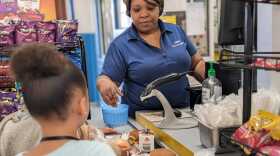North Carolina lawmakers are looking for ways they can help get fresh fruits and vegetables to corners of the state -- urban and rural -- where they’re difficult to access.
Non-profit organizations and local governments across the country have for years identified areas known as “food deserts” across the country, but the House Committee on Food Desert Zones is the first effort by state lawmakers to address the issue.
Members of the bi-partisan committee, which is meeting four times before the General Assembly reconvenes for its session in May, are hearing from grocery store managers, public health officials and non-profit workers and looking at potential courses of action, such as tax incentives for stores that open in food deserts.
More than 410,000 people live in 171 food deserts across North Carolina.
Those numbers are according to a Duke University study published in 2012. The Centers for Disease Control define a food desert as an area without access to affordable fruits, vegetables, whole grains, low-fat milk and other foods that make up the full range of a healthy diet. Some research links them to diet-related problems.
Rep. Yvonne Holley, a Democrat who represents Southeast Raleigh, says she started looking at affordable fresh food options last year, when the Kroger chain closed two stores to her constituents: One on Martin Luther King Blvd, and another on New Bern Avenue. House Speaker Thom Tillis convened a special committee to address the issue after she introduced a bill regarding food deserts in last year’s session.
"You know, you hear about things, but I didn't see it as a food desert. I didn't realize how in North Carolina we have a couple of counties that the whole county is a food desert." - Rep. Yvonne Holley
“You know, you hear about things, but I didn't see it as a food desert,” Holley said about the area where the stores closed. “I didn't realize how in North Carolina we have a couple of counties that the whole county is a food desert.”
Holley said she’s looking to address food accessibility by collaborating with businesses, public health groups and local governments. The committee’s second meeting is scheduled for 1 p.m. today at the Legislative Office Building in Raleigh.








